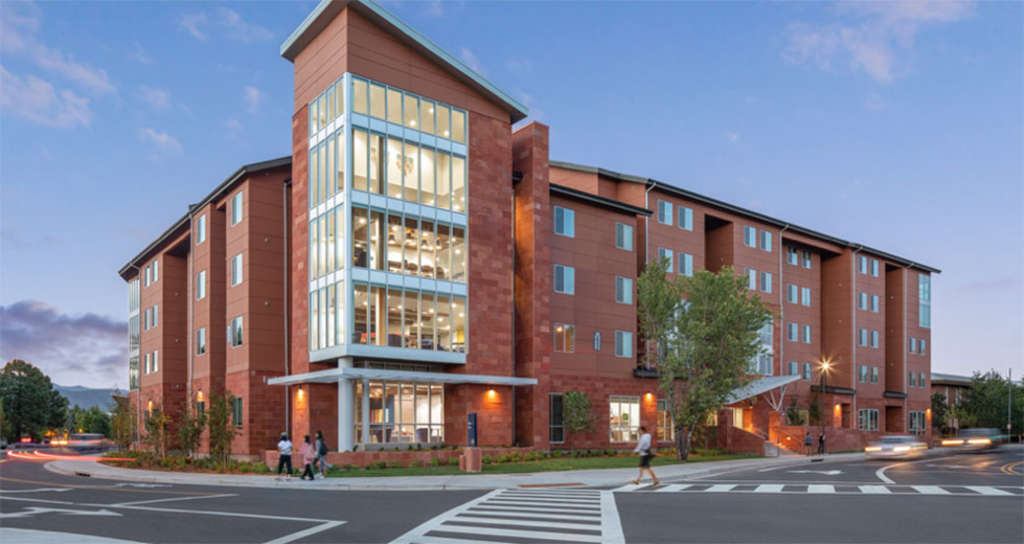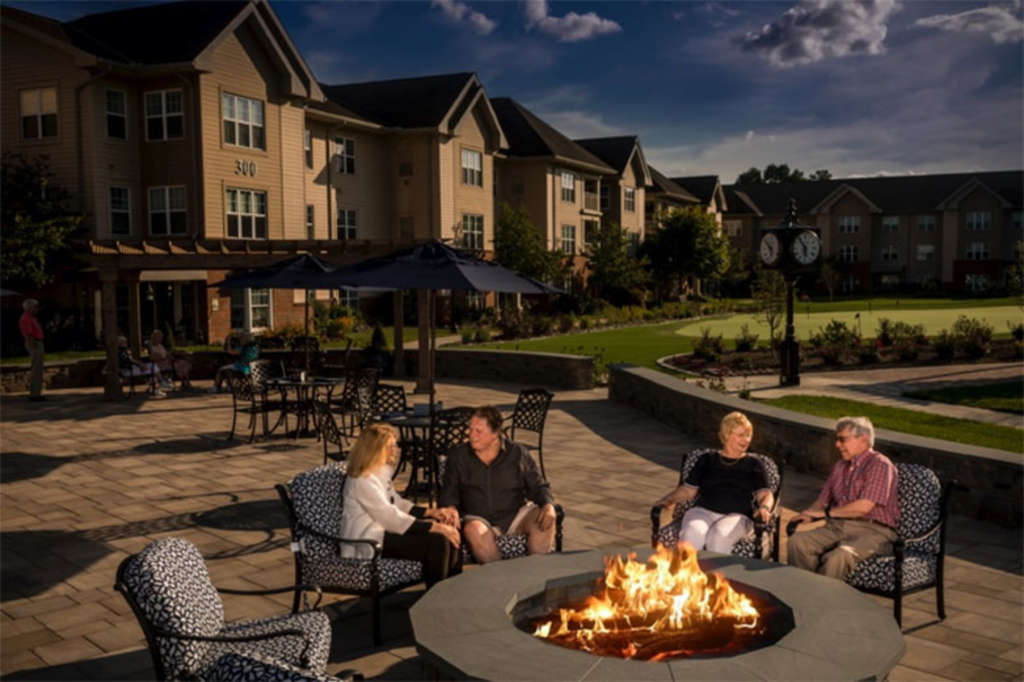
The Benefits of University Based Retirement Communities: Opportunities for Lodging
by Frederick J. DeMicco, Ph.D., RDN, HAFIA, Abraham Pizam, Ph.D., Jackie Guzman, and Shelly Rahav
University-Based Retirement Community concepts have been on the rise over the past decade and the trend has held due to the growing needs and wants of retiring Baby Boomers (Clark & Smith, 2021). Retirees residing at a University-Based Retirement Community enjoy more than the standard amenities provided at a traditional senior living community. Residents at a UBRC have the opportunity to use state-of-the-art university facilities and services such as healthcare, fitness centers and libraries, have access to sports games and collegiate activities, ability to enroll in university courses, and the opportunity to mentor university students. For universities, the main benefits are to intimately include a larger age demographic on campus and in some cases, benefit financially from a UBRC.
Andrew Carle (Carle, 2019) – an Adjunct Lecturer at Georgetown University’s Aging & Health Program – designed five-point criteria for a successful UBRC that is still a strong resource for universities pursuing a UBRC affiliated with its campus. Carle explained that Baby Boomer retirees have different desires than retirees of past generations. Baby Boomers are no longer purchasing homes in traditional age-based communities, instead, they are looking for a retirement rich with fulfillments. Baby Boomer retirees prefer the appeal of UBRC amenities such as attending a university’s football games, music concerts, or enrolling in university courses, over the traditional model of a retirement community (Carle, 2006). It is important to note that University-Based Retirement Communities appeal to retirees in general, not only to alumni of a specific university (Marcus, 2019).
There are a variety of ways that universities can build a University-Based Retirement Community affiliated with its campus. A university can choose to:
- build and operate its own UBRC,
- land-lease to a third-party company to operate and/or build the UBRC, and/or
- partner with an existing retirement community within close proximity of the university’s campus.
A partnership with an existing retirement community can range from access to limited university amenities, to residents of the retirement community enjoying full access to university amenities, resources, courses, and shuttle services.
Employing a third party to operate the UBRC or for the university to partner with an existing retirement community are the options that have proven to be best for both universities and for retirees. Many UBRC communities found that external expertise is required to operate a profitable and sustainable community with residents who are pleased with their social, intellectual, and living facilities and amenities (Carle, 2006). Most, if not all UBRCs are Continuing Care Retirement Communities (CCRC) that provide within the community a continuum of aging care needs from independent living to assisted living, skilled nursing, and memory care.

Partnering with a university offers a variety of advantages for senior living management companies. Offering university classes and resources, while growing in popularity, is a unique amenity that will attract more retirees to the community. Finding new ways to attract retirees is especially important now because over the past few years, the senior living industry has seen the lowest occupancy rates since the Great Recession (Carle, 2019). Experts believe that UBRCs will be mainstream within the next 20 years (Inside The Future of University Partnerships In Senior Living), so establishing these university relationships and programming now will be an investment towards the future of the industry.
This partnership also offers great advantages to the universities. Some UBRCs require a certain number of residents to be alumni of the partnering university. This could foster greater affinity towards the university and encourage residents to become donors. Not only that, but senior residents are year-round residents of their communities, meaning that university classes and amenities will be used year-round as well, which will allow underutilized university resources to be used to their fullest potential (Starke). Lastly, UBRCs can create jobs and opportunities for the university, involving additional teaching, research, or even volunteer opportunities for faculty and students (Starke). Not only that, but the University of Central Florida just launched their brand-new Bachelor of Science in Senior Living Management degree, which nicely complements their new UBRC, Legacy Pointe.
To understand what makes a successful University-Based Retirement Community, two well-known examples will be reviewed: The Village at Penn State and Legacy Pointe at UCF. Below are other notable examples of UBRCs:
- Vi at Palo Alto — Stanford University — Palo Alto, CA
- The Mirabella — Arizona State University — Tempe, AZ
- University Commons — University of Michigan — Ann Arbor, MI
- Lasell Village — Lasell University — Newton, MA
- Oak Hammock — University of Florida — Gainesville, FL
- Holy Cross Village — Notre Dame — Notre Dame, IN
The Village at Penn State offers a dynamic community that connects seniors living at The Village to campus life and connects Penn State University students to The Village campus as well, creating a vibrant relationship between the two campuses and its residents. The Village offers residents amenities and services above and beyond the traditional ones of a retirement community (The Village at Penn State Retirement Community), such as:
- The ability to attend free classes at the university (dependent on space-available).
- The opportunity to attend events in the Bryce Jordan Center and the Center for Performing Arts.
- Lessons in golf, swimming, tennis, and other sports from college athletes.
- Connecting with university students as a mentor or project assistant.
- Golfing at the Penn State courses at a reduced rate.
- Contributing at university cultural and educational seminars.
- The opportunity to attend regular classes through on-site Road Scholar classes or the Osher Lifelong Learning Institute.

In addition to these fantastic benefits, The Village at Penn State has recently been awarded the 2019-2020 Best Nursing Home Award from U.S. News as well as The Inquirer’s Top Workplaces Award (The Village at Penn State Retirement Community). The Village at Penn State is an example of a UBRC which is owned and operate by a third party. The Village at Penn State is owned by Liberty Lutheran, which is a faith-based, non-profit organization.

Legacy Pointe at UCF is another distinguished UBRC example that will be opening. In addition to similar amenities provided by The Village at Penn State, Legacy Pointe at UCF will also offer unique connections to all UCF colleges, including Hospitality, Medicine, Nursing, Education, Sciences, Public Health and Arts and Humanities. The colleges have committed to provide tools and resources to make Legacy Pointe at UCF an outstanding community. Each college has a seat on the board of directors which is composed of industry experts, university appointed faculty and administrators, and the CEO of the university foundation. Most markedly is the Rosen College of Hospitality Management at the University of Central Florida which continually assists Greystone – the operator of Legacy Pointe – in the design and operation of world-class hospitality and dining services, outstanding entertainment, and traveling opportunities for the residents. The benefit for students at the Rosen College of Hospitality Management is the ability to do internships at the community and learn in a real-world setting. It is worth noting that Legacy Pointe was the impetus for starting an undergraduate degree in Senior Living Management at Rosen College (About Legacy Pointe & the University of Central Florida).
Conclusion and Recommendations
University-Based Retirement Communities are a trend that will not be disappearing. Retirees are searching for a retirement that does not compare to the retirement experiences of previous generations. UBRCs offer retirees a strong intergenerational connection, opportunities for personal and intellectual growth, and access to university cultural and sporting events. For universities, UBRCs offer strong intergenerational ties for students and older adults, opportunities for mentorship, and for students majoring in the fields of healthcare or hospitality, the chance to practice their knowledge and skills in a real retirement community. For these ample benefits to retirees and universities’ communities at large, UBRCs are highly recommended for use in all Tertiary Educational Institutions all over the world.
Also, as an added benefit, university students in hospitality and hotel management can gain Hand’s On experiential learning at the UBRC while studying on campuses such as at the Rosen College of Hospitality Management at the University of Central Florida. These graduates will be the future managers and leaders of our UBRCs.
References
- About Legacy Pointe & the University of Central Florida. (n.d.). Retrieved February 01, 2021, from https://www.legacypointeatucf.com/ucf-affiliation/
- Carle, A. (2019, April 22) Can Universities Retirement Communities Reverse Aging? Forbes. Retrieved February 01, 2021, from https://www.forbes.com/sites/andrewcarle/2019/04/22/can-university-retirement-communities-reverse-aging/?sh=3492cde62558
- Carle, A. (2006, September 1). University-Based Retirement Communities: Criteria for Success. Retrieved February 01, 2021, from https://www.iadvanceseniorcare.com/university-based-retirement-communities-criteria-for-success/
- Clark, A., & Smith, C. (2021, January 13). Life On a College or University Campus – An Alternative Retirement Destination. Retrieved February 01, 2021, from https://www.theseniorlist.com/retirement/best/university/
- College-Linked Retirement Communities. (2019, October 25). Retrieved February 01, 2021, from https://www.retirementliving.com/college-linked-retirement-communities
- Inside The Future of University Partnerships in Senior Living (2017, November 16). Retrieved July 18, 2021, from https://resources.seniorhousingnews.com/inside-the-future-of-university-partnerships-in-senior-living?utm_source=shn_homepage&utm_medium=website&utm_campaign=shn_homepage_carousel#preview
- Marcus, J. (2019, August 14). New College Communities Custom-Built for Retirees. Retrieved February 01, 2021, from https://www.aarp.org/retirement/planning-for-retirement/info-2019/colleges-with-retirement-communities.html
- Starke, A. (n.d.). University Based Retirement Communities: The Who, What, When, Where & Why. Retrieved July 18, 2021, from https://pmdas.com/university-based-retirement-communities-the-who-what-when-where-why/
- The Village at Penn State Retirement Community. (n.d.). Retrieved February 01, 2021, from https://www.retireatpennstate.org/index



